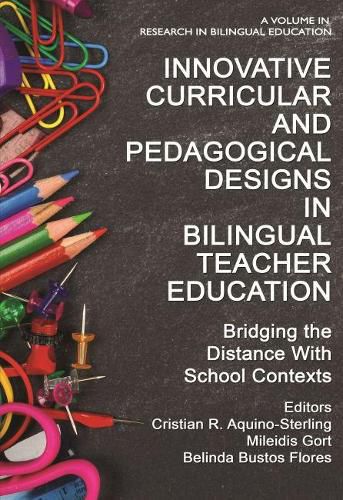Readings Newsletter
Become a Readings Member to make your shopping experience even easier.
Sign in or sign up for free!
You’re not far away from qualifying for FREE standard shipping within Australia
You’ve qualified for FREE standard shipping within Australia
The cart is loading…






This title is printed to order. This book may have been self-published. If so, we cannot guarantee the quality of the content. In the main most books will have gone through the editing process however some may not. We therefore suggest that you be aware of this before ordering this book. If in doubt check either the author or publisher’s details as we are unable to accept any returns unless they are faulty. Please contact us if you have any questions.
Unequivocally, advocacy for bilingual learners has been at the forefront of educators’ work and has also led to critical theoretical advancements and policies. Nevertheless, the bilingual education field has been challenged by unsystematic curricular innovations and few important pedagogical advances (Garci a, in Adelman Reyes & Kleyn, 2010, p. viii). As a result, research on curricular and pedagogical innovations in bilingual teacher education and its impact on bilingual curriculum and instruction is still nascent.
This edited volume extends our field of studies by highlighting novel 21st century curricular designs and pedagogical practices in the preparation of future bilingual teachers and their relevance for advancing curriculum, instruction, and educational achievement across bilingual school contexts. In particular, the volume provides a much-needed overview of innovative bilingual teacher preparation practices designed and implemented to develop bilingual teacher professionals equipped to effect curricular and pedagogical changes in bilingual settings. As such, two main questions guiding the orchestration of the volume are: (a) What innovative curricular and pedagogical designs characterize the field of bilingual teacher education in 21st century? and (b) How do or could these innovative curricular and pedagogical approaches for educating future bilingual teachers influence teacher practices in bilingual contexts for advancing curriculum, pedagogy and the achievement of bilingual learners?
Following the knowledge construction process characterizing how new curricular and pedagogical developments are established in the field of bilingual teacher education, a distinctive feature of the volume pertains to how its twelve chapters are organized along efforts to develop, implement, and/or research innovative bilingual teacher preparation practices from a range of theoretical, analytical, and research traditions
$9.00 standard shipping within Australia
FREE standard shipping within Australia for orders over $100.00
Express & International shipping calculated at checkout
This title is printed to order. This book may have been self-published. If so, we cannot guarantee the quality of the content. In the main most books will have gone through the editing process however some may not. We therefore suggest that you be aware of this before ordering this book. If in doubt check either the author or publisher’s details as we are unable to accept any returns unless they are faulty. Please contact us if you have any questions.
Unequivocally, advocacy for bilingual learners has been at the forefront of educators’ work and has also led to critical theoretical advancements and policies. Nevertheless, the bilingual education field has been challenged by unsystematic curricular innovations and few important pedagogical advances (Garci a, in Adelman Reyes & Kleyn, 2010, p. viii). As a result, research on curricular and pedagogical innovations in bilingual teacher education and its impact on bilingual curriculum and instruction is still nascent.
This edited volume extends our field of studies by highlighting novel 21st century curricular designs and pedagogical practices in the preparation of future bilingual teachers and their relevance for advancing curriculum, instruction, and educational achievement across bilingual school contexts. In particular, the volume provides a much-needed overview of innovative bilingual teacher preparation practices designed and implemented to develop bilingual teacher professionals equipped to effect curricular and pedagogical changes in bilingual settings. As such, two main questions guiding the orchestration of the volume are: (a) What innovative curricular and pedagogical designs characterize the field of bilingual teacher education in 21st century? and (b) How do or could these innovative curricular and pedagogical approaches for educating future bilingual teachers influence teacher practices in bilingual contexts for advancing curriculum, pedagogy and the achievement of bilingual learners?
Following the knowledge construction process characterizing how new curricular and pedagogical developments are established in the field of bilingual teacher education, a distinctive feature of the volume pertains to how its twelve chapters are organized along efforts to develop, implement, and/or research innovative bilingual teacher preparation practices from a range of theoretical, analytical, and research traditions